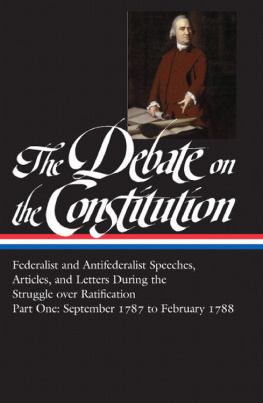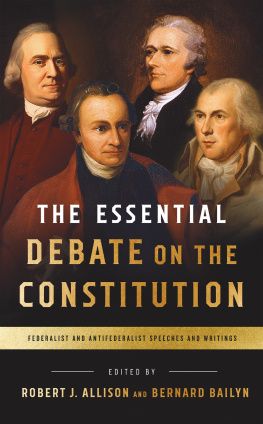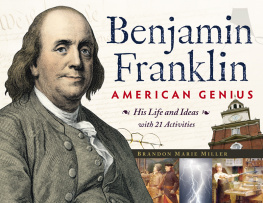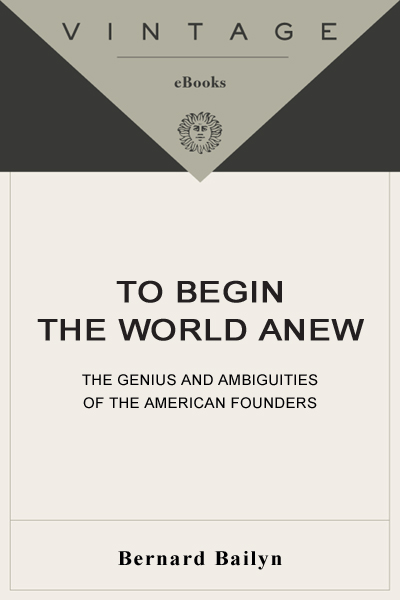
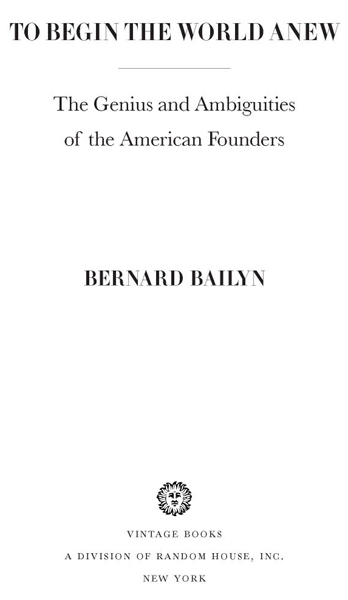
Table of Contents
FOR LOTTE
AND THE WOMEN OF FIVE GENERATIONS
EDITED AND COEDITED WORKS
The Apologia of Robert Keayne
Pamphlets of the American Revolution, 17501776
The Intellectual Migration: Europe and America, 19301960
Law in American History
The Press and the American Revolution
Strangers Within the Realm: Cultural Margins of the First British Empire
The Debate on the Constitution (2 vols.)
Preface
These studies, though written over a period of years, have a unity of purpose and a consistency of theme. They are an attempt to probe aspects of the founding of the American nation through analysis of certain uniquely important people and documents and through study of the location, the context, of the Revolutionary generation in the greater world of which they were a part. That they were provincials marginal, borderland peoplein the broad context of eighteenth-century Euro-American civilization profoundly conditioned their lives and, I believe, stimulated their imaginations, freed them from instinctive respect for traditional establishments, and encouraged them to create a new political world. The results of their efforts however groping, unfinished, and tentativeproved to be a turning point in the political history of Western civilization, radiating out through Europe and Latin America with effects that were as important as they are difficult to interpret.
Through all the chapters two themes, two convictions, remain constant: that these were truly creative people, and that their creative efforts, the generation-long enterprise that elevated these obscure people from their marginal world to the center of Western civilization, were full of inconsistencies, logical dilemmas, and unresolved problems. I have attempted to explain the ambiguities that so beset Jeffersons career; the strange interplay between lofty idealism and cunning realism in Franklins spectacular success in Paris (and along the way the interplay between that high-spirited, suave, humorous, insouciant philosophe and his dutiful, upright, earnest, worried, neo-Puritan colleague Adams). I have similarly sought to explore the desperate struggle of the writers of the Federalist papers to reconcile the need for a powerful, coercive public authority with the preservation of the private liberties for which the Revolution had been fought, and, in a wider perspective, to sketch the reception, itself ambiguous, of the Founders tensely balanced thought by political reformers throughout the Atlantic world.
The Founders were remarkably articulate people. They wrote easily, profusely, and clearly, and they left to posterity a monumental record of their thoughts, their struggles, and their accomplishments. But sometimes words, however profuse and precise, fail: they are so embedded in unconscious assumptions and unquestioned, unperceived conditions that they leave unremarked essentials of peoples lives. Imagesvisual representationscan sometimes illuminate these elusive elements. And so I have used imagesto gauge the dimensions of the Founders provincialism, the subtlety of Franklins artful self-imaging, and the peculiar idealization of Americas revolution abroad in what has been called the age of the democratic revolution.
What follows, therefore, are sketches, assessments of essential elements in a complex history. If these probes convey a sense of the accomplishments of this extraordinary generation together with an awareness of the ambiguities, uncertainties, and perplexities in what they diddifficulties that persist into our own timethey will serve a useful purpose.
B.B.
I
Politics and the Creative Imagination
For some time I have been puzzling over the sources of the cre-ative imagination. I began close to home with an effort some years ago to probe the creative imagination among historians,1 but I have tried to go beyond that, to uncover some general clues to the sources of those mysterious impulses that propel the mind beyond familiar ground into unexpected territoriesthat account for the sudden appearance of creative configurations of thought, expression, vision, or sound.
At times the creative imagination seems to work in isolation, when an individual, impelled by some uninstructed spark of originality, glimpses relationships or possibilities never seen before, or devises forms of expression never heard before. But most often the creative imagination does not flare in isolation. Creative minds stimulate each other, interaction and competition have a generative effect, sparks fly from disagreement and rivalry, and entire groups become creative. We know something about how that has happenedhow such creative groups have formedin art, in science, in scholarship, and in literature; but the same, I believe, has happened in politics, though in ways we do not commonly perceive. I do not mean sudden turns in legislation or public policy. I mean the recasting of the world of power, the re-formation of the structure of public authority, of the accepted forms of governance, obedience, and resistance, in practice as well as in theory.
The creative reorganization of the world of power and all its implications has happened at various points in history, but rarely, if ever, I believe, as quickly, as successfully, andso it seems to meas mysteriously as by a single generation on the eastern shores of North America two hundred years ago.
The Founders of the American nation were one of the most creative groups in modern history. Some among them, especially in recent years, have been condemned for their failures and weaknessesfor their racism, sexism, compromises, and violations of principle. And indeed moral judgments are as necessary in assessing the lives of these people as of any others. But we are privileged to know and to benefit from the outcome of their efforts, which they could only hopefully imagine, and ignore their main concern: which was the possibility, indeed the probability, that their creative enterprisenot to recast the social order but to transform the political systemwould fail: would collapse into chaos or autocracy. Again and again they were warned of the folly of defying the received traditions, the sheer unlikelihood that they, obscure people on the outer borderlands of European civilization, knew better than the established authorities that ruled them; that they could successfully create something freer, ultimately more enduring than what was then known in the centers of metropolitan life.
Since we inherit and build on their achievements, we now know what the established world of the eighteenth century flatly denied but which they broke through convention to proposethat absolute power need not be indivisible but can be shared among states within a state and among branches of government, and that the sharing of power and the balancing of forces can create not anarchy but freedom.
We know for certain what they could only experimentally and prayerfully proposethat formal, written constitutions, upheld by judicial bodies, can effectively constrain the tyrannies of both executive force and populist majorities.
We know, because they had the imagination to perceive it, that there is a sense, mysterious as it may be, in which human rights can be seen to exist independent of privileges, gifts, and donations of the powerful, and that these rights can somehow be defined and protected by the force of law.
Next page

